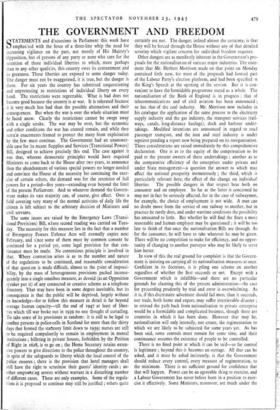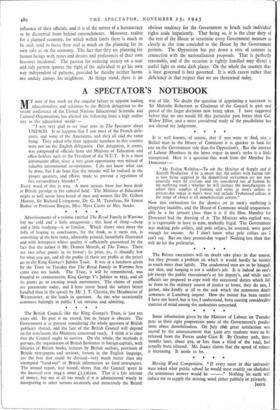THE GOVERNMENT AND FREEDOM
STATEMENTS and discussions in Parliament this week have emphasised with the force of a three-line whip the need for increasing vigilance on the part, not merely of His Majesty's Opposition, but of persons of any party or none who care for the retention of those individual liberties to which, more perhaps than to any other qualities, this country owes its contentment and its greatness. These liberties are exposed to some danger today. The danger must not he exaggerated, it is true, but the danger is there. For six years the country has submitted unquestioning and unprotesting to restrictions of individual liberty on every hand. The restrictions were regrettable. What is bad does not become good because the country is at war. It is tolerated because it is very much less bad than the possible alternatives and their consequences. But when the war is over the whole situation must be faced anew. Clearly the restrictions cannot be swept away with a single stroke. The war may be over, but the economic and other conditions the war has created remain, and while they remain enactments framed to protect the many from exploitation by the few must continue. The Government had an unanswer- able case for its recent Supplies and Services (Transitional Powers) Bill, designed to achieve precisely this end. The case against it was that, whereas democratic principles would have required Ministers to come back to the House after two years, to announce then the abandonment of various special powers no longer needed and convince the House .of the necessity for continuing the exer- cise of certain others, the demand was for the retention of full powers for a period—five years—extending even beyond the limit of the present Parliament. And to whatever demand the Govern- rrent makes its vast majority can, of course, give effect. Over a Feld covering very many of the normal activities of daily life the citizen is left subject to the arbitrary decision of Ministers and civil servants.
The same issues are raised by the Emergency Laws (Transi- tional Provisions) Bill, w hose second reading was carried on Tues- day. The necessity for this measure lies in the fact that a number of Emergency Powers Defence Acts will normally expire next February, and since some of them must by common consent be continued for a period yet, some legal provision for that con- tinuance must be made. No contentious principle is involved in that. Where contention arises is as to the number and nature of the regulations to be continued, and reasonable consideration of that question is made difficult, almost to the point of impossi- bility, by the mass of heterogeneous provisions packed inconse- quently into a single omnibus measure, as devoid (as an Opposition speaker put it) of any connected or creative scheme as a telephone directory. That may have been in some degree inevitable, but its consequence is that the public will be deprived, largely without its knowledge—for to follow this measure in detail is far beyond average human- capacity—till the end of 1947 at least of liber- ties which till war broke out in 1939 no one thought of curtailing. To take some of its provisions at random: it is still to be legal to confine persons in police-cells in Scotland for more than the thirty days that formed the statutory limit down to 1939; nurses are still to be required compulsorily to remain in employment in mental institutions ; billeting in private houses, forbidden by the Petition of Right in 1628, is to go on ; the Home Secretary retains exten- sive powers to give directions to the police throughout the country, in spite of the safeguards to liberty which the local control of the- police ensures ; there is the provision that hotel managers shall still have the right to scrutinise their guests' identity cards ; an- other empowering arrests without warrant in a disturbing number of different cases. These are only examples. Some of the regula- tions it is proposed to continue may still be justified ; others quite certainly are not. The danger, indeed almost the certainty, is that they will be forced through the House without any of that detailed scrutiny which vigilant concern for individual freedom requires.
Other dangers are as manifestly inherent in the Government's pro- posals for the nationalisat:on of various major industries. The state- ment that Mr. Herbert Morrison made on that point on Monday contained little new, for most of the proposals had formed part of the Labour Party's election platform, and had been specified .11 the King's Speech at the opening of the session. But it is con- venient to have the formidable programme stated as a whole. The nationalisation of the Bank of Englond is in progress ; that of telecommunications and of civil aviation has been announced ; so has that of the coal industry. Mr. Morrison now includes it, his catalogue the application of the same process to the electricity supply industry and the gas industry, the transport services (rail- ways, canals, long-distance haulage), dock and harbour under- takings. Modified intentions are announced in regard to , road passenger transport, and the iron and steel industry is under reprieve pending a report now being prepared on its reorganisation. Three considerations are raised immediately by this comprehensive declaration. One is as to the equity of the compensation to be paid to the present owners of these undertakings ; another as to the comparative efficiency of the enterprises under private and under State management—a question the answer to which may affect the national prosperity momentously ; the third, which is particularly relevant here, the effect of the change on individual liberties. The possible dangers in that respect bear both on consumer and on employee. So far as the latter is concerned he may not in fact be seriously affected, for in the case of railwaymen, for example, the choice of employment is not wide. A man can no doubt move from the service of one railway to another, but in practice he rarely does, and under wartime conditions the possibility has amounted to little. But whether he will find the State a more reasonable and human employer may be questioned ; it will be too late to think of that once the nationalisation Bills are through. As for the consumer, he will have to take whatever he may be given. There will be no competition to make for efficiency, and no oppor- tunity of changing to another purveyor who may be likely to serve him better.
In view of this the real ground for complaint is that the Govern- ment is insisting on carrying all its nationalisation measures at once. Confident in its doctrines, it is piling one scheme on another regardless of whether the first succeeds or not. Except with a Government which is infallible—and there are no particular grounds for claiming this of the present administration—the case for proceeding prudently by trial and error is overwhelming. As it is, if this doctrinaire adventure should fail more than it succeeds, our trade, both home and export, may suffer irretrievable disaster ; to retread the path back from nationalisation to private enterprise would be a formidable and complicated busineis, though there are countries in which it has been done. However that may be, nationalisation will only intensify, not create, the regimentation to which we are likely to be subjected for some years yet. As has been said, some controls must remain for some time, and their continuance assumes the existence of people to be controlled.
There is no fixed point at which it can be said—so far control is legitimate ; beyond this-it becomes an outrage. All that can be asked, and it must be asked insistently, is that the Government should reduce every control, every measure of regimentation, to the minimum. There is no sufficient ground for confidence that that will happen. Power can be an agreeable thing to exercise, and a Labour Government has never before been in a position to exer- cise it effectively. Some Ministers, moreover, are much under the influence of their officials, and it is of the nature of a bureaucracy to be dictatorial from behind entrenchments. Moreover, zealots for a planned economy, for which within limits there is much to be said, tend to focus their zeal as much on the planning for its own sake as on the economy. The fact that they are planning for human beings with tastes and desires and preferences of their own becomes incidental. The passion for ordering society on a neat and tidy pattern ignores the right of the individual to go his own way independent of patterns, provided he thereby neither harms nor unduly annoys his neighbour. As things stand, there is an obvious tendency for the Government to brush such individual rights aside impatiently. That being so, it is the clear duty of the rest of the House to scrutinise every Government measure as closely as the time conceded to the House by the Government permits. The Opposition has put down a vote of censure in connection with the nationalisation proposals. That is perfectly reasonable, and if the occasion is rightly handled may direct a useful light on some dark places. On the whole the country that is least governed is best governed. It is with excess rather than deficiency in that respect that we are threatened today.



























 Previous page
Previous page